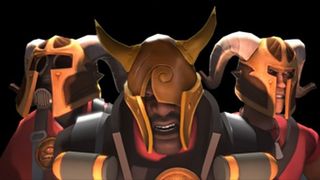Cliff Blezsinski defends EA microtransactions, tells gamers: "vote with your dollars"

The ongoing debate over the ethicality of microtransactions is hot enough to make the sun look like an ice cube, but it's difficult to overlook the financial benefits of prolonging a game beyond its launch content—just ask EA, which recently stated it's seeking to add purchaseable items in all of its games . Consumer concern is natural, but former Epic designer Cliff Bleszinski thinks wallets are a stronger measure of approval than complaints. In a lengthy blog article , he specifically brings up the business practices of EA and Valve, stating he's "tired" of the former taking the brunt of ire surrounding the subject.
"I'm going to come right out and say it: I'm tired of EA being seen as 'the bad guy,'" he writes. "I think it's b******* that EA has the 'scumbag EA' memes on Reddit and that Good Guy Valve can do no wrong.
"It blows my mind that somehow gamers don't seem to get that Valve is a business, just like any other, and when Valve charges $100 for an engagement ring in Team Fortress 2, it's somehow 'cool,'" he continues. "Yet when EA wants to sell something similar, it's seen as 'evil.'
"Yes, guys, I hate to break it to you, but as awesome as Valve is, they're also a company that seeks to make as much money as possible. They're just way better at their image control."

Bleszinski goes on to claim "making money and running a business is not inherently evil" and compares Origin's currently unfavored reputation with Steam's reception during its shaky first years.
"People love to beat up on Origin, but they forget that, for a good amount of time, Steam sucked," he writes. "No one took it seriously for the first while. When Gabe pitched it at GDC to my former co-workers years ago, they came back with eye-rolls. Who's laughing now? All of Valve.
"It took Valve years to bang their service into the stellar shape that it is in these days. Yet somehow, everyone online forgets this, and they give EA crap about trying to create their own online services. Heaven forbid they see our digital roadmap for the future and try to get on board the 'games as services' movement."
The biggest gaming news, reviews and hardware deals
Keep up to date with the most important stories and the best deals, as picked by the PC Gamer team.
He finishes with a simple piece of advice: "If you don't like EA, don't buy their games. If you don't like their microtransactions, don't spend money on them. EA has many smart people working for them, and they wouldn't attempt these things if they didn't work. Turns out, they do. I assure you there are teams of analysts studying the numbers behind consumer behavior over there that are studying how you, the gamer, spends his hard earned cash."
Response was swift. A NeoGAF thread ballooned with various comments ranging between hostile, sympathetic, and fearful.
"It's one thing to say you'll start putting microtransactions in every $60 game you'll make and another thing to have microtransactions on a-free to-play game, where a big percentage of that microtransaction money actually goes to the players, who themselves make items to sell," writes one poster.
"Overall, if I see DLC that I don't like, I just ignore it," writes another. "If a game has too much DLC to the point in which the main game is really lacking in content then I just won't buy the game. Simple. Don't get why some are acting like they are being forced into doing something."
Omri Petitte is a former PC Gamer associate editor and long-time freelance writer covering news and reviews. If you spot his name, it probably means you're reading about some kind of first-person shooter. Why yes, he would like to talk to you about Battlefield. Do you have a few days?
Most Popular





